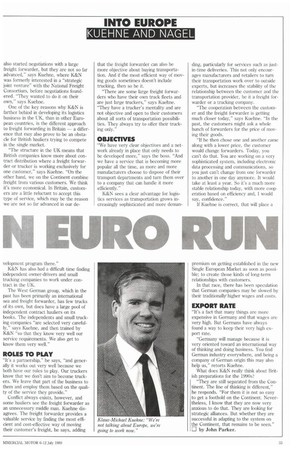INTO EUROPE KUEHNE AND NAGEL
Page 35

If you've noticed an error in this article please click here to report it so we can fix it.
also started negotiations with a large freight forwarder, but they are not so far advanced," says Kuehne, where K&N was formerly interested in a "strategic joint venture" with the National Freight Consortium, before negotiations foundered. They wanted to do it on their own," says Kuehne.
One of the key reasons why K&N is farther behind in developing its logistics business in the UK, than in other European countries, is the different approach to freight forwarding in Britain — a difference that may also prove to be an obstacle for British hauliers trying to compete in the single market.
"The structure in the UK means that British companies know more about contract distribution where a freight forwarder or trucker is working exclusively for one customer," says Kuehne. "On the other hand, we on the Continent combine freight from various customers. We think it's more economical. In Britain, customers are a little reluctant to accept this type of service, which may be the reason we are not so far advanced in our de that the freight forwarder can also be more objective about buying transportation. And if the most efficient way of moving goods sometimes doesn't include trucking, then so be it.
"There are some large freight forwarders who have their own truck fleets and are just large truckers," says Kuehne. They have a trucker's mentality and are not objective and open to their customers about all sorts of transportation possibilities. They always try to offer their trucking only."
OBJECTIVES
"We have very clear objectives and a network already in place that only needs to be developed more," says the boss. "And we have a service that is becoming more popular all the time, as more and more manufacturers choose to dispose of their transport departments and turn them over to a company that can handle it more efficiently."
K&N sees a clear advantage for logistics services as transportation grows increasingly sophisticated and more deman ding, particularly for services such as justin-time deliveries. This not only encourages manufacturers and retailers to turn their transportation work over to outside experts, but increases the stability of the relationship between the customer and the transportation provider, be it a freight forwarder or a trucking company.
"The cooperation between the customer and the freight forwarder is getting much closer today," says Kuehne. "In the past, the customers might ask a whole bunch of forwarders for the price of moving their goods.
"If he then chose one and another came along with a lower price, the customer would change forwarders. Today, you can't do that. You are working on a very sophisticated system, including electronic data processing and communications, so you just can't change from one forwarder to another in one day anymore. It would take at least a year. So it's a much more stable relationship today, with more cooperation based on efficiency and, I would say, confidence."
If Kuehne is correct, that will place a




















































































































